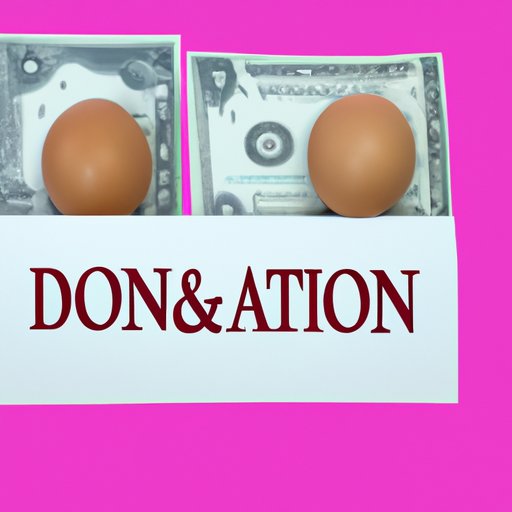
I. Introduction
Have you ever thought about donating eggs? If you are a healthy woman between the ages of 21 and 33 and want to help someone build a family, egg donation can be a fulfilling experience. Not only does it allow you to make a difference in someone’s life, but it also provides financial compensation for your time and effort. In this article, we will explore how to donate eggs for money and guide you through the egg donation process.
II. A Beginner’s Guide to Egg Donation: How to Make Money by Helping Others
Egg donation is the process of retrieving eggs from a donor and fertilizing them with sperm for the purpose of creating embryos that can be transferred to a woman’s uterus or used for research. Infertility is one of the primary reasons for egg donation, as some individuals and couples have difficulty conceiving on their own. By donating eggs, you can help give them the opportunity to have a child.
Becoming an egg donor is a simple process that involves several important steps, including a thorough medical screening and a series of injections to stimulate your egg production. As a result, not everyone is eligible to participate. Women who smoke, have certain medical conditions, or are unwilling to complete the process are not able to donate eggs.
III. Egg Donation: The Pros, Cons, and Process
There are several benefits to donating eggs, including financial compensation, the satisfaction of helping others, and the knowledge that you are contributing to medical research. It is important to note, however, that egg donation does come with certain risks, including the potential for ovarian hyperstimulation syndrome (OHSS) and the risk of future infertility. It is crucial to discuss these risks with your doctor and egg donation agency before proceeding.
The egg donation process typically takes between 3-6 weeks and involves several steps, including:
- Screening process: This includes a medical history interview, physical exam, bloodwork, and an ultrasound.
- Stimulation: You will receive medication to stimulate egg production and several monitoring appointments to track your progress.
- Harvesting: Once your eggs are ready, they will be collected during a minor surgical procedure under sedation.
IV. Egg-ceptional Donation: The Financial Rewards of Helping Others
One of the main benefits of donating eggs is the financial compensation that comes along with the process. Depending on the agency and location, donors can make anywhere from $5,000 to $15,000 per donation. While the process can be time-consuming and involves some discomfort, the financial rewards can make a significant difference in your life.
V. Your Ultimate Guide to Egg Donation: From Screening to Payment
The screening process is essential in determining your eligibility to donate eggs. During this process, you will undergo genetic and medical testing, complete a psychological evaluation, and provide detailed information about your medical history and lifestyle. It is important to be honest and forthcoming with all information to ensure the safety of you and the recipients.
If you are selected to become an egg donor, you will receive guidelines and advice to follow during the stimulation process. This includes information on how to administer the injections, and what to expect during the process. You will also learn about different types of egg donation compensations, including cycle cancellation, cycle completion, and egg modification.
VI. A Step-by-Step Guide to Egg Donation: Maximizing Your Earnings
Before starting the egg donation process, it is important to prepare yourself both physically and mentally. This includes abstaining from alcohol and drugs, and eating a healthy diet. Once you begin the medication, it is crucial to follow the protocols exactly as directed by your healthcare provider.
To ensure that you are always an eligible donor, it is important to follow certain criteria, such as maintaining a healthy weight, not using contraception, and taking care of your mental health. You can also negotiate and maximize your compensation by understanding the different options and asking questions.
VII. Egging on Financial Success: The Business of Egg Donation
It is important to keep in mind that egg donation is a business. It is important to work with a reputable egg donation agency that has your best interests in mind. Some ethical and legal concerns to keep in mind include the possibility of signing away your parental rights to any children born, and the possibility of being contacted by the children you helped create later in life.
When searching for an agency, do your research and read reviews from other donors. You can also ask friends or family members for recommendations as well.
VIII. How to Make a Difference and Money with Egg Donation
Egg donation is a selfless act of giving back to those in need. When recipients receive donated eggs, they have the chance to create a happy family, something that they may not have been able to do without your help. It is important to note that the process is not just about making money, but also making a difference.
There are countless success stories of recipients who have been able to start families thanks to egg donation. Hearing these stories can be a powerful and inspiring motivation to donate your eggs.
IX. Conclusion
In conclusion, donating eggs is a life-changing opportunity that can help you make a difference in someone’s life while also providing financial compensation. By following the screening process, preparing yourself both physically and mentally, and working with a reputable agency, you can donate your eggs and make a positive impact on the lives of others.




